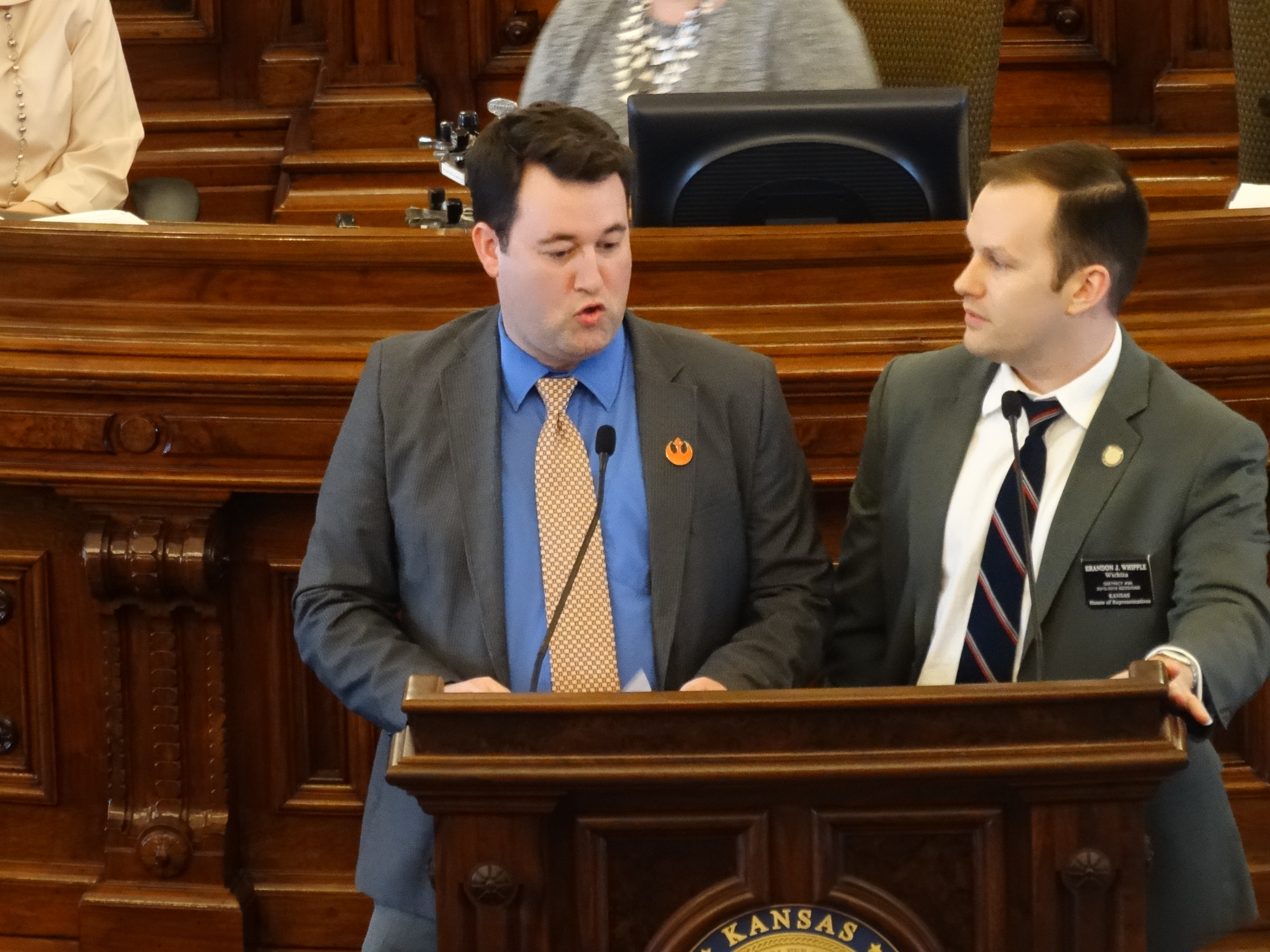Not trusting ‘the feds,’ Kansas House gives first approval to call for constitutional convention

Rep. Brett Hildabrand, left, R-Shawnee, answers questions from Rep. Brandon Whipple, D-Wichita, about a resolution calling for a constitutional convention of the states to rein in the power of the federal government.
Topeka ? Conservatives in the Kansas House advanced a resolution Thursday calling for a constitutional convention of the states to reign in the power of the federal government. But it remains unclear whether they can muster the two-thirds majority needed on final action to pass the resolution on to the Senate.
The House voted 77-44 to advance the measure to final action. That’s short of the two-thirds majority, or 84 votes, needed to approve a concurrent resolution.
A convention of the states is one of two methods provided in the U.S. Constitution for passing amendments. It requires that two-thirds of the U.S., or 34 states, petition Congress to call a convention. Once called, the convention can recommend proposed amendments, but those amendments still must be ratified by three-fourths, or 38, of the states before they take effect.
The current effort to call a convention is being spearheaded by an organization called Citizens for Self Governance and by former U.S. Sen. Tom Coburn, R-Oklahoma, who spoke to a legislative committee just before the House debate.

Rep. Brett Hildabrand, left, R-Shawnee, answers questions from Rep. Brandon Whipple, D-Wichita, about a resolution calling for a constitutional convention of the states to rein in the power of the federal government.

Former U.S. Sen. Tom Coburn, R-Oklahoma, speaks to a House committee Thursday urging passage of a measure calling for a constitutional convention of the states to rein in the power of the federal government.
“The very things that made this country great are being undermined, and all you have to do is look at who’s popular, like in our presidential election,” he said. “Something’s astir, and what’s astir is disgust with the government. And we have to restore the rule of law.”
Coburn resigned from the Senate in 2014, four years into his second term, to focus on the campaign for a constitutional convention.
So far, five other states — Georgia, Florida, Alabama, Alaska and Tennessee — have passed resolutions similar to the one being considered in Kansas.
It calls for holding a convention for the limited purposes of proposing amendments that “impose fiscal restraints on the federal government, limit the power and jurisdiction of the federal government and limit the terms of office for its officials and for members of Congress.”
On the floor of the House, several conservatives spoke about the mounting federal debt. They also said they believe the federal government, particularly the courts, have overstepped their bounds, intruding into powers they believe should be reserved for the states.
Rep. John Whitmer, R-Wichita, said he supported the resolution because he has lost faith in the federal government.
“For me, it’s a very simple process. I don’t trust the feds; I trust the folks,” he said.
Rep. Amanda Grosserode, R-Lenexa, was just one conservative to use the word “tyranny” in describing recent federal actions.
“I give you the Waters of the USA,” Grosserode said, referring to a recent Environmental Protection Agency action that conservatives argue greatly expanded the reaches of the Clean Water Act into creeks and ponds that had not been regulated before. “To my own family members who are farmers and ranchers, I ask you, is this the law passed by our Congress, or imposed by regulatory law?”
Rick Levy, who teaches constitutional law at Kansas University, said it’s understandable why some people think the regulatory power of the federal government has grown in modern times, even though the basic language of the Constitution has not.
“In 1789, commerce among the states was pretty limited,” he said, referring to the Commerce Clause as one example. “It took a long time to get from one state to another. There wasn’t refrigeration. There weren’t trains or planes or buses or anything like that. So the power to regulate commerce among the states is relatively small.”
“Fast-forward 250 years later,” he said. “People are flying around the country. There’s virtually nothing you buy that’s entirely local. And the national economy is fully integrated, so at that point the power to regulate interstate commerce is much broader, just because there’s a lot more interstate commerce.”
Several House members who opposed the resolution pointed to what they saw as potential dangers. Rep. John Carmichael, D-Wichita, for example, argued that it did not specify which powers of the federal government the sponsors wanted to limit, leaving open the possibility that the convention could recommend ending Social Security, Medicare or the Affordable Care Act.
But Rep. Brett Hildabrand, R-Shawnee, a lead supporter of the measure, said the convention would only have the power to make recommendations. It would still take action by three-fourths, or 38 states, to ratify them.
Final action on the resolution in the House is expected next week.






